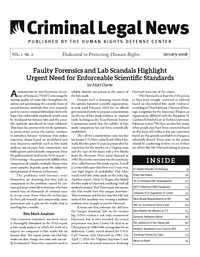by Matt Clarke
A 2009 report by the National Academy of Sciences (“NAS”) criticizing the varying quality of crime labs throughout the nation and questioning the scientific basis of several forensic methods that were routinely used to convict criminal defendants led to the hope that enforceable standards would soon be developed for forensic labs and the scientific methods introduced in court validated. That hope has proven to be overly optimistic, as prosecutors across the nation continue to introduce forensic testimony that makes unproven claims based on invalidated and even disproven methods such as bite mark analysis, microscopic hair comparison, and bullet groove and tool mark comparison. Even the gold standard cited in the NAS report—DNA testing—has proven to be fallible when comparison of complex, multiple-donor crime scene samples depends upon the subjective interpretation of forensic technicians.
The problems with forensic tests themselves are daunting, but they pale in comparison to the problems caused by corrupt and inept crime lab technicians who have tainted tens of thousands of criminal cases in recent years. Even when the technicians do their job honestly and competently, some prosecutors put a spin on the results that is anything but scientific.
Bite …
by David M. Reutter
Following the 2016 U.S. Supreme Court ruling in Hurst v. Florida, 136 S. Ct. 616 (2016), which concluded that Florida’s death penalty sentencing scheme violated the Sixth Amendment and was thus unconstitutional, the state’s death machine came to a screeching halt and was in …
by Richard Resch
Happy New Year and welcome to Criminal Legal News (“CLN”). If you’re reading this, you’re likely familiar with the Human Rights Defense Center (“HRDC”) and its companion publication, Prison Legal News (“PLN”). We’ve sent the first issue of CLN to all …
by Mark Wilson
Applying the Discovery Rule in determining when the applicable two-year statute of limitations (“SOL”) begins to run on “judicial deception” claims, the U.S. Court of Appeals for the Ninth Circuit held that a claim brought three-and-a-half years after a search warrant was executed was not …
by Mark Wilson
The U.S. Court of Appeals for the Ninth Circuit reversed the dismissal of unreasonable seizure and First Amendment violation claims. The Court held that there were disputed issues of material fact on whether police had probable cause to cite plaintiff for obstructing a buffalo herding …
by Matt Clarke
In a 5-3 opinion handed down on March 28, 2017, the U.S. Supreme Court held that the Texas Court of Criminal Appeals (“CCA”) violated the Eighth Amendment and Supreme Court precedent when it relied upon its own previous opinion and superseded medical standards to conclude …
by Derek Gilna
Add overly aggressive collection of DNA samples from often unwitting individuals to the list of questionable police tactics in New York City with which criminal defense attorneys and the general public must now deal. Operating under the radar until recently, the city has been quietly …
by Brandon Sample, Esq.
If you are a state prisoner hoping to find a sympathetic ear for a federal habeas petition, two recent decisions from the U.S. Supreme Court illustrate the challenges one must overcome.
Kernan v. Cuero
Michael Cuero sought federal habeas release, arguing that …
by Matt Clarke
In May 2017, Texas Attorney General Ken Paxton ruled that civilly committed sex offenders have a right to vote by mail ballot. The ruling puts an end to the confusion surrounding the issue, which resulted in all the mail ballots belonging to residents of the …
by Christopher Zoukis
The United States Court of Appeals for the Second Circuit vacated an improperly enhanced sentence of 46 months for illegal reentry after deportation.
In 2009, Roman Bartolo Genao, a national of the Dominican Republic, was convicted in New York state court of first-degree burglary …
by David Reutter
In response to a federal district court’scertified questions of law, the Tennessee Supreme Court held that when imposing split confinement sentences under the Tennessee Sentencing Reform Act of 1989, a trial judge is authorized to fix a percentage that the defendant must serve in actual …
by Christopher Zoukis
The Idaho Supreme Court handed down an opinion on September 22, 2017 that clarified an important exception to the requirement that police officers obtain a warrant prior to conducting a search. The exception known as “search incident to arrest” allows police to conduct a warrantless …
by Mark Wilson
The Louisiana Supreme Court held that an attorney representing an incarcerated felon is not subject to La. R.S. § 44:31.1 when making a public records request to get information in connection with a potential post-conviction relief application.
La. R.S. § 44:31.1 provides that “an …
by David M. Reutter
The U.S. Department of Justice (“DOJ”) determined that two Louisiana police agencies utilized unconstitutional “investigative holds.” The practice was used by the Evangeline Parish Sheriff’s Office (“EPSO”) and the Ville Platte Police Department (“VPPD”) to arrest and hold people in jail without obtaining a …
by Christopher Zoukis
New York Chief Administrative Judge Lawrence K. Marks issued a bold (and much needed) new rule on November 7, 2017. Intended to remind prosecutors of their duty to disclose exculpatory material to the defense, the rule requires that all trial judges in the state issue …
by Mark Wilson
The Oregon Supreme Court upheld the dismissal of murder charges against a defendant who pleaded guilty under a plea agreement to assaulting a victim who subsequently died.
In August 2013, Trevin Michael King, 17, and an adult co-defendant assaulted a man and stole his …
by Derek Gilna
A federal racketeering investigation into Baltimore Police Department misconduct has resulted in the dismissal of approximately 300 pending prosecutions and investigations into an additional 850, including some that were already closed. News reports revealed that body camera footage from three separate incidents during the summer …
by Derek Gilna
Suffolk County, New York residents concerned about crime in their community apparently did not need to look any further than the activities of their own district attorney, Thomas Spota, 76. He and his aide, Christopher McPartland, were federally indicted in October of 2017 for helping …
by Mark Wilson
On April 28, 2017, the Idaho Supreme Court reversed the dismissal of a class action lawsuit alleging that Idaho’s public defense system violates federal and state constitutional standards. The Court held that claims against the State and the Idaho Public Defense Commission (“PDC”) were improperly …
Loaded on
Dec. 19, 2017
published in Criminal Legal News
January, 2018, page 25
On October 11, 2017, California Governor Jerry Brown signed into law much-needed protection for minors who are targeted by police for questioning. Senate Bill 395 requires that minors 15 years of age or younger consult with a lawyer in person, by telephone, or by video conference before a custodial …
by David Reutter
The U.S. Court of Appeals for the Sixth Circuit ruled a one-legged woman exonerated of murder can sue a Kentucky State Police (“KSP”) detective whom the woman charged framed her. In connection with her case, a Louisville Metro Police Department (“LMPD”) detective who was integral …
by Derek Gilna
In most jobs, if you kick a defenseless person multiple times and attempt to cover it up, you will not only get fired, but will probably also get arrested and sent to jail. Not so in Hartford, Conn., where cops, Steven Barone and Christopher Mastroianni, …
by Christopher Zoukis
The Georgia Supreme Court unanimously ruled on October 2, 2017 that a convicted murderer was entitled to a new trial because the original trial transcript was destroyed in a fire, and the State’s efforts to recreate it were wholly insufficient.
Craig Johnson was found …
by Mark Wilson
Less than three months into the Trump administration, the President’s assault on science, truth, and all things Obama reached the criminal justice system. Under Trump’s watch, a commission working to improve the reliability of forensic evidence has been abolished.
In 2013, the Obama Administration …
by Mark Wilson
The Mississippi Supreme Court upheld contempt sanctions against a criminal defense attorney, finding that he prejudiced the jury against the judge and prosecutor when he insinuated that they were preventing him from telling the truth.
Adofo Minka represented William Wilson on firearms charges. The …
by Matt Clarke
Where can you face criminal prosecution for doing your job? The answer is New Orleans if you work for the Orleans Public Defenders (“OPD”).
Prosecutors in New Orleans have been threatening to criminally charge the public defenders and investigators who conscientiously do their jobs, …
by Mark Wilson
The U.S. Court of Appeals for the Seventh Circuit held that federal courts lack jurisdiction to hear declaratory judgment actions filed by a city’s executive branch against its legislative branch. “State courts may have authority to resolve an intramural dispute,” the Court observed. “Otherwise it …
by Mark Wilson
The United States Court of Appeals for the Ninth Circuit affirmed the suppression of evidence of gang affiliation obtained without Miranda warnings.
On July 4, 2012, Antonio Gilton was arrested for murder and invoked his right to counsel. He was taken to jail and …
by Christopher Zoukis
Police officers are sworn to uphold the law. When the uniform goes on, they become arbiters and enforcers of right and wrong. But a new police crime database reveals an important and often overlooked aspect of the job: Police officers are people first, cops second. …
by Mark Wilson
The U.S. Court of Appeals for the Eighth Circuit reversed summary judgment in favor of four police officers on an excessive force claim while arresting protestors of the Michael Brown police shooting death.
White Ferguson Police Officer Darren Wilson shot African-American teenager Michael Brown …
Loaded on
Dec. 19, 2017
published in Criminal Legal News
January, 2018, page 35
Arkansas: On October 16, 2017, former Gateway Police Chief and Benton County Constable Grant Hardin, 48, was sentenced to 30 years in prison after admitting to fatally shooting James Appleton in February. He pleaded guilty to first-degree murder in a plea agreement in which the prosecution reduced the charge …






